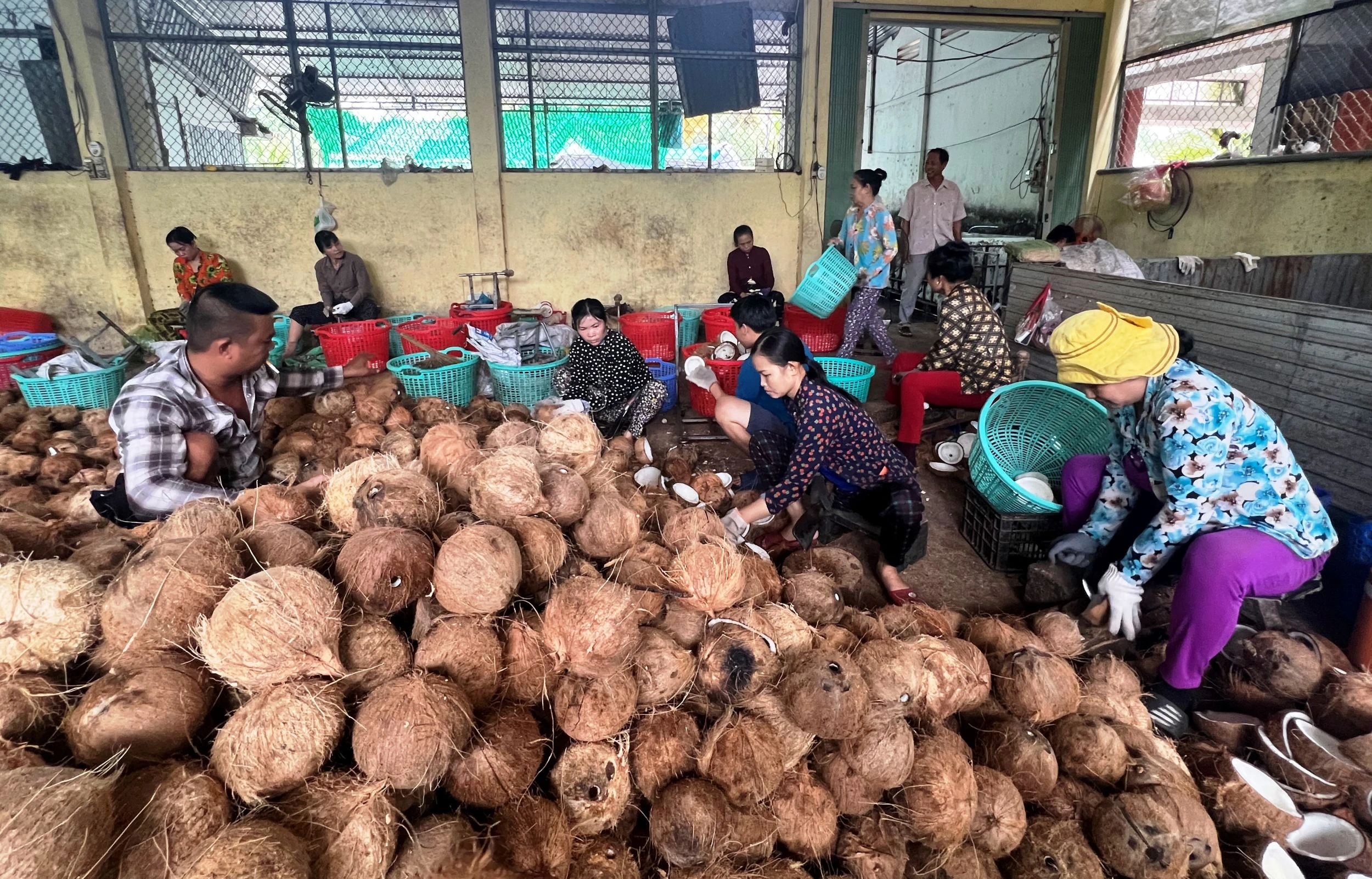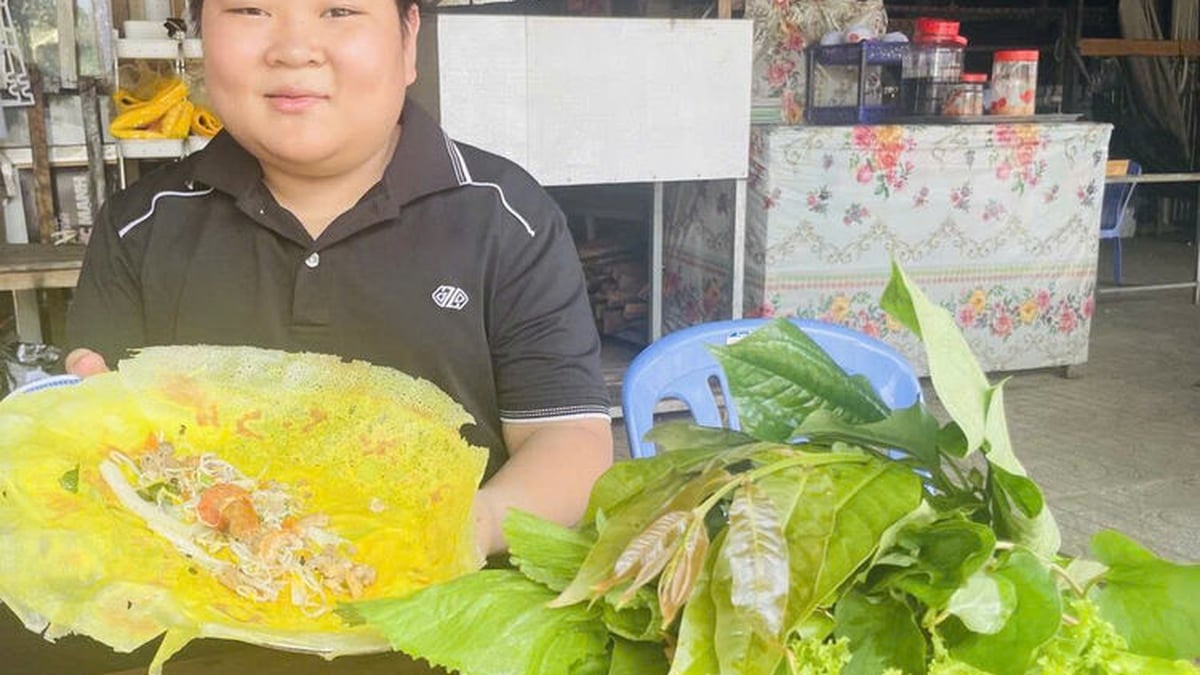Traders buy coconuts in Ben Tre for processing and export.
* Sir, what is the reason for the continuous increase in raw coconut prices recently, causing many factories to lack coconuts for processing and export?
- It is true that coconut prices are increasing very high in the Mekong Delta region and other places; in addition, in countries that grow a lot of coconut in Asia, coconut prices are also fluctuating at the highest level in many years. The reason is that this year's weather is not favorable, causing coconut crop failures in many countries. In Vietnam, the coconut yield this season is also not high due to the impact of previous drought and salinity, and climate change; on the other hand, it is currently the off-season (hanging crop), so coconut output is not much. Meanwhile, the demand for fresh coconut and coconut products in the world is increasing, leading to "supply not meeting demand" pushing coconut prices up continuously.
* The current paradox is that coconut prices are high but a series of factories processing coconut products for export are struggling with a shortage of coconuts; while a large quantity of raw coconuts are exported abroad?
- This is a rather difficult problem that the coconut industry is currently facing. According to information from the Ben Tre Province Coconut Association, about 40-50% of the local coconut output is currently exported in raw form to foreign countries (mostly to China), which has forced a series of coconut processing factories to reduce their operating capacity, or even run at a standstill due to a severe shortage of raw materials.
Currently, some countries in the world are implementing a policy of banning the export of raw coconuts to give priority to domestic enterprises for stable production such as the Philippines and Malaysia. In addition, Indonesia is the country with the largest coconut raw material area in the world. Recently, many enterprises in the Mekong Delta have imported raw coconuts from Indonesia for production despite suffering disadvantages in transportation costs. The Indonesian Government is studying to impose an 80% tax on exported raw coconuts to give priority to raw materials for domestic factories and only encourage the export of fresh coconuts. At a number of international conferences, the Indonesian Government has stated its orientation to completely ban the export of raw coconuts in the near future. Therefore, many enterprises producing deeply processed coconut products that are importing raw materials from Indonesia such as India, Israel, Pakistan, etc. are comparing the long-term advantage in raw coconut prices between Indonesia and Vietnam, aiming to switch to importing raw coconuts from Vietnam. In addition, in recent years, the Thai agricultural sector has gradually shifted to growing fresh coconuts with the characteristics of fast harvest and low investment costs... This has caused factories in Thailand to become scarce in raw coconuts for processing and they have switched to importing raw coconuts from Vietnam. The above factors show that Vietnam's coconut resources are increasingly "bleeding" abroad quite a lot, causing domestic factories to not have enough coconuts for deep processing, affecting export contracts and creating jobs for many workers in factories.
It should be noted that in 2023, fresh Vietnamese coconuts will be exported to the US market and in 2024, China will approve the official export of fresh Vietnamese coconuts to this market, creating a large wave of investment from enterprises in China, India, Sri Lanka, Israel, etc. In particular, it is necessary to mention enterprises investing in deep processing of coconut products with high value, meeting the needs of customers from many demanding markets such as the US, Europe, the Middle East, etc. The Vietnam Coconut Association has developed a medium and long-term plan to encourage enterprises to invest in raw material areas that meet international standards, are sustainable in circulation, and have high value, etc.
Therefore, to ensure the source of coconut materials for deep processing in domestic factories to increase value, the Vietnam Coconut Association is developing a plan to submit to the competent authority for consideration of imposing a tax of about 5% on raw coconut exports. Specifically, the Vietnam Coconut Association plans to propose to the Prime Minister, the Ministry of Finance... to consider imposing a tax on raw, unprocessed coconut exports such as dried coconut (item code 0801.11.00) at a tax rate of 5%; coconut with intact shell (item code 0801.12.00) at a tax rate of 5%.
* However, there are concerns that if raw coconut export tax is imposed, domestic coconut prices will fall, affecting coconut farmers?
- We have considered this. In the past, the Vietnam Coconut Association has participated in many forums, seminars and listened to the opinions of experts and businesses producing deeply processed products from coconut. Previously, in 2011, we imposed a 3% export tax on coconuts and then the domestic price of coconuts dropped sharply, because at that time Vietnam only had 13 businesses and 5 factories producing products from coconuts for export, so the consumption of coconut output was limited. Meanwhile, we now have hundreds of businesses and establishments processing and trading all kinds of coconuts; including more than 45 deep processing factories, with more than 200 coconut products serving domestic consumption and export such as desiccated coconut, coconut milk, canned coconut water, coconut candy, coconut jelly, activated carbon, coconut fiber, coconut oil... exported to 90 countries and territories around the world. With such capacity, coconut consumption for farmers in the Mekong Delta will basically be stable.
The view is to impose an export tax of 5% on raw coconuts, in order to stabilize the source of raw materials for domestic enterprises to feel secure in production, and limit the export of raw materials with low value. Fresh coconuts are still encouraged to be exported and the tax rate is kept at 0%.
In addition, the Association also surveyed the cost of raw coconuts including seedlings, land, care, etc., which is about 3,200 VND/fruit. Since the beginning of 2025, the price of raw coconuts has increased by 150% compared to the average price in the past 3 years. Specifically, the purchase price of coconuts at the garden in the first quarter of 2025 was 13,500 VND/fruit, minus the cost price of 3,200 VND/fruit, farmers made a huge profit. The Association proposed a 5% export tax on raw coconuts to create revenue for the budget and bring the price of coconuts back to 8,000-10,000 VND/fruit, then the coconut tree still shows its ability to bring significant benefits and good profits to farmers.
* Thank you sir.
According to the Vietnam Coconut Association, the country currently has more than 200,000 hectares of coconut, mainly concentrated in the Mekong Delta and the Central Coast, with an average output of 2 million tons per year. If in 2015, Vietnam had 8 factories producing and exporting coconut products, by 2024 there will be 45 factories processing deep coconut products. In particular, many enterprises have invested in high-tech factories, invested in raw material areas of tens of thousands of hectares meeting international standards to serve the needs of producing high-quality products such as Ben Tre Import-Export Joint Stock Company (Betrimex), Luong Quoi Coconut Production Company Limited, Ben Tre Coconut Investment Joint Stock Company (Beinco) ... In which, Beinco Company not only produces conventional coconut products, but also organic products. Beinco is focusing on developing the coconut product value chain and has a service of researching, developing and manufacturing products according to orders, including organic products. Beinco has a modern factory and a high-quality coconut material area, meeting international standards; this unit is providing a variety of coconut products such as coconut milk, concentrated coconut milk, coconut cream, dried coconut meat, virgin coconut oil, coconut milk with jelly, carbonated coconut water, coconut water with coconut meat, etc.
It can be said that the coconut processing industry in the Mekong Delta is developing quite strongly and reaching out to the world. Therefore, preserving the source of coconut materials for deep processing and high value needs to be prioritized...
PHUOC BINH (performed)
Source: https://baocantho.com.vn/nghich-ly-nganh-dua-gia-cang-tang-nha-may-cang-khon-don-vi-thieu-nguyen-lieu-hoat-dong-a186904.html



































































































Comment (0)